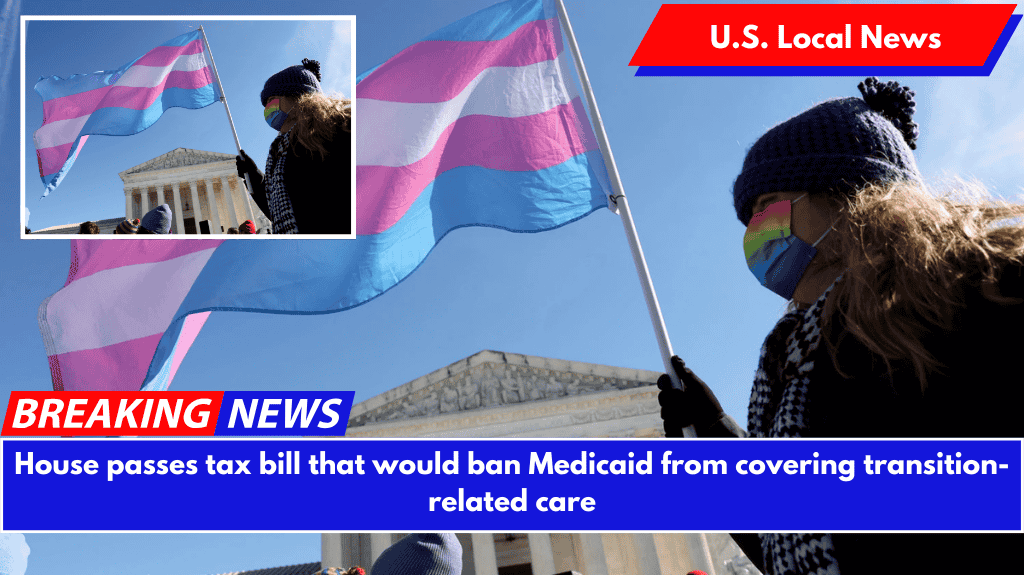The House passed a tax bill on Thursday that would prohibit Medicaid coverage of all transgender care and plans offered through the Affordable Care Act’s exchanges from including such care as an essential health benefit, potentially jeopardizing access to care for hundreds of thousands of trans adults and an unknown number of minors.
The bill initially prohibited Medicaid from covering “gender transition procedures” for minors, such as puberty blockers, hormone therapy, and surgery.
Late Wednesday, House Republican leadership removed the terms “minors” and “under 18 years of age” from the section, according to The Independent.
The GOP-led House Rules Committee approved the amendment on Wednesday night, and the full House passed it on Thursday morning.
Another provision of the bill would make transition-related medical care ineligible as an essential health benefit under health-care plans offered through the Affordable Care Act marketplace.
Federal law mandates that essential health benefits packages cover 10 categories of benefits, though state-specific packages differ. Nearly half of states prohibit health insurance providers from explicitly refusing to cover transitional care.
The tax bill’s prohibitions may have a significant impact on hundreds of thousands of transgender adults in the United States. According to a recent report from the Williams Institute at UCLA School of Law, approximately 180,000 transgender adults rely on Medicaid for primary insurance.
According to a 2023 study, approximately 312,000 trans adults (24.6%) are on Medicaid, with an estimated population of 1.3 million in the United States.
It’s unclear how many transgender adults are covered by the health care marketplace. In January, the Department of Health and Human Services reported that nearly 24 million individuals had enrolled in marketplace coverage.
An additional 300,000 young people aged 13 to 17 identify as transgender, and it’s unclear how many of them have Medicaid or marketplace insurance plans.
President Donald Trump has made limiting transgender people’s access to care a top priority for his administration. In the first few weeks of his presidency, he has signed several executive orders targeting trans people, including proclaiming that the government will recognize only two unchangeable sexes, prohibiting trans women and girls from playing on female sports teams, barring transgender people from serving openly in the military, and limiting access to gender-affirming care nationwide for trans people under the age of 19.
Republicans, including Trump, oppose transition-related care for minors, citing their inability to make informed decisions and the lack of long-term research on some treatments.
Most major medical associations, including the American Medical Association, American Academy of Pediatrics, and American Psychological Association, support access to care for transgender people. LGBTQ advocates and medical professionals argue that such arguments are inaccurate and spread misinformation.
House Speaker Mike Johnson, R-La., who helped negotiate the amendment among Republicans, did not immediately respond to a request for comment. The White House did not immediately respond to a request for comment on whether it supports the amendment.
LGBTQ advocates began speaking out forcefully against the tax bill on Thursday. Jennifer Pizer, chief legal officer at Lambda Legal, an LGBTQ advocacy organization, said it’s unclear how the administration intends to argue against transition care for adults, who can make their own medical decisions and are well researched and supported.
“It makes the animus, the hostility, against this group of people unmistakable,” Pizer told reporters. “Under any standard of constitutional review, laws based on animus or hostility to a group are not legitimate.”
If the bill becomes law as written, Pizer believes it will face a legal challenge for potentially violating the Constitution’s equal protection clause, which requires that laws treat all people equally.
Following a lawsuit by Lambda Legal and other LGBTQ advocacy groups, a federal judge blocked Trump’s executive order that would have cut off federal funding to medical schools and hospitals that provide transition care to minors.
The bill would also be in direct conflict with laws in half of the states that prevent insurers from denying coverage for gender-affirming care.
In those cases, Pizer said, states could use their own funds to continue providing care through state Medicaid plans. Still, “that’s not a happy answer for people who live in other parts of the country, where states themselves are hostile to transgender people and this medical care.”
“This aggressive effort to reimpose exclusions, it’s about hostility to a group, and it’s a political movement,” she told the audience. “It does not come from medical experts or providers who work with real patients. This is a political issue, not one that is justified by our medical programs.”











